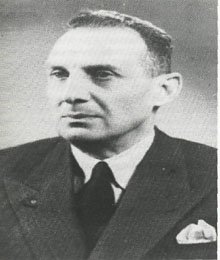by Marianthi Theodoropoulou,
Lawyer
Constantine Gardikas was born in the city of Patras in 1896 and died in Athens in

1984. Constantine, was the son of George Gardikas, Professor of Philosophy at the University of Athens. Thus Constantine developed into a prolific scientist with a solid classical education.
He studied law in Athens, and he continued his studies in Zurich and Geneva specializing in criminal law and criminology. He received his doctorate degree at the age of 22 and then he started lecturing at the University of Geneva, Switzerland.
In 1919 he returned to Greece and was appointed by the government of Eleftherios Venizelos to the post of Deputy Secretary General of Macedonia, and in 1920 he took over the management of correctional services of Smyrna’s High Commissioner (Υπάτης Αρμοστείας Σμύρνης), responsible for the organization of prisons.
After the war in Asia Minor and the surrender of Spyrna to Turkey, Gardikas returned to Athens, where he undertook the organization of the Police Directorate of the newly created Ministry of the Interior. Later he participated in the setting up by international scholars of INTERPOL. C. Gardikas played an important role in forensic sciences within the Police Department. , and he introduced modern crime investigation techniques . Conseuqnetly, he assisted in the elimination of obsolete and unsafe methods that were in use at the time.
In 1923, he organized the Criminalistics’ Agency, which later became the Directorate of Criminalistic Services, where he served for 41 years.
In 1930, he was elected associate Professor of the newly created chair of Forensics at the University of Athens Law School, and nine years later he became a full Professor.
He held that post until 1968.
Publications
The early works of Gardikas had strong historical intonations. We refer to: The Heroics

of the Ancient Greeks (Ph.D. thesis, 1918), The Ancient Greek, and Particularly Athenian, Criminal and Homicidal Legislation (1919), The Crime of Adultery (1923), The Crime of Adultery Under the Laws of the Byzantine Empire (1925), The History of Custodial Sentences (1953).
One important contribution of Gardikas to penal sciences was his participation in the publication of the first scientifiv journal on penal sciences in Greece, namely: Poinika Chronika ( Penal Chronicles), Another important contribution was the of a three volume work on Forensic. The first edition appeared in 1934 and it was entitled “Lessons of Forensics”. This volume , consisted of 54 pages only and referred to three main topics: a) Alcohol and drugs, b) The effects of age and climate on crime levels, and c) Gambling and crime. This volume wassupplemented later with other topics such as employment and crime, urban and rural crime in Greece, and crimes in Greece according to the place they are committed. Thus in 1936, Gardikas eventually published the complete first volume of Criminology, consisting of 400 pages.
The second volume of Criminology was published in 1938 and included the individual causes of crime, namely the categories of offenders, their personal characteristics and criminal responsibility, as well as the organization of Police in fighting crime.
Finally, a third volume appeared covering the correctional treatment of criminals.
It is noteworthy that C. Gardikas continued to develop his main handbook By 1968 the first volume on Causes of crime was revised 6 times, , the second volume on Police had six revisions, and the third volume on corrections four.
The above, together with the fact that he continued his writing and publishing activity up the age of80 (circa) in the Journal of Penal Chronicles, suggest that it is no exaggeration to state that his death was a significant loss to the academic and scientific community of the penal sciences
For more information, please, see the publication of the Centre for Penal and Criminolgical Research,No 1, Constantinos Gardikas: the father of Criminology in Greece (In Greek).





